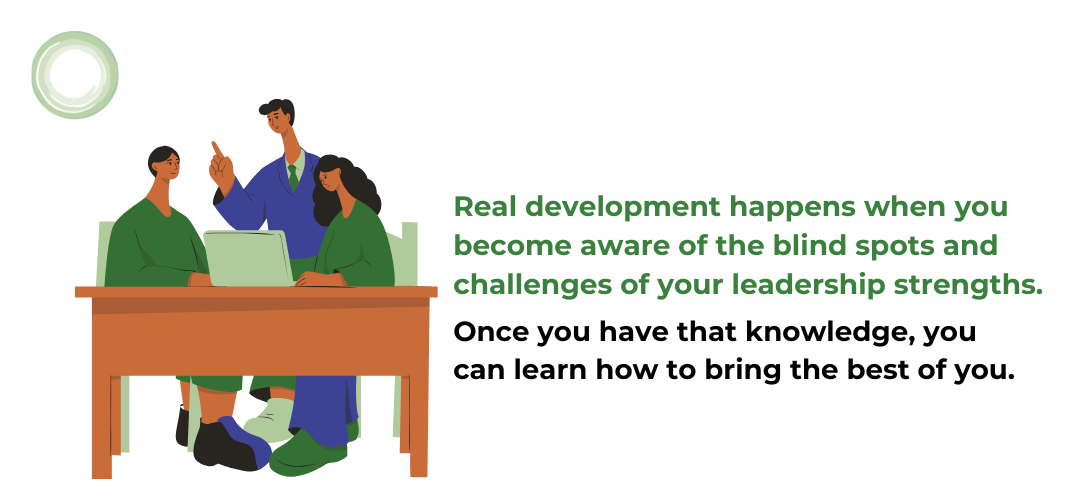You’ve heard about playing to your strengths, right? It’s gained popularity in some circles over the years and the idea is to focus on developing your strengths as a leader and basically circumvent your weaknesses. After all, it’s certainly more enticing to expand upon what comes naturally to you.
While this is an appealing idea, it’s not actually where the real leadership development happens. It’s a chapter of the story — definitely not the whole manuscript. Just like reading only one chapter of a book leaves you without the full, rich picture, working on strengths alone misses a lot of key details.
Why Focusing Only on Strengths Isn’t Enough
When leading team offsites for my clients, some have asked to include a StrengthsFinder exercise as part of my program. I’m always happy to incorporate this because it is very useful to know what your strengths are (and surprisingly, many people aren’t clear on their real strengths).
But the reality is, the “just play to your strengths” motto is taking the easy way out in terms of leadership development. Nice story. . . just doesn’t produce real growth. The simple truth is, strengths can be overused and become a serious liability in terms of leadership effectiveness.
Yes, I did say overused.
Curious how your strengths might be holding you back? Take our free leadership Enneagram quiz to find your core patterns and growth edges.
When Strengths Become Pitfalls
Development that focuses only on building strengths can be “too much of a good thing.” Organizational development expert Daniel Ofman has shown how our core strengths may easily morph into unwanted extremes – a pitfall. Want to know how your strength might be sabotaging your leadership? That’s where 360 leadership feedback becomes your superpower.
For example, let’s say your strength is being decisive — which is a wonderful quality! But, if you’ve forged ahead, worked just on your strength and done a 360 review process, you may be getting feedback now that you’re excessively pushy. Or let’s say you have high standards for quality work, but taken too far, you go from being a boss that encourages the best from people to being a dreaded micro-manager.
Get the picture?
If you only focus on your strengths, you may say, “Yeah! I should be even more and more decisive!” Sounds nice and probably easy for you. . .but everyone else is getting frustrated because you’ve taken it way too far. In fact, they know there’s room for you to be less pushy and incorporate feedback from others.
We would argue that focusing on building strengths without doing the hard work to see how your strength can become a pitfall, is like making a New Year’s Resolution to lose weight but not actually addressing the two factors that can help you lose weight: diet and exercise.
What you really want to do after identifying your strengths is become aware of their potential pitfalls and understand when and why you might be challenged to keep your strength working for you. What you really need to learn is how to keep your strength in balance.
Want to prevent your strengths from becoming liabilities? Download our free guide to delegation — perfect for perfectionists and over-doers.
Allergies, Triggers, and Overuse in Team Dynamics
And why is that so hard? Because we all have triggers, or “allergies” to workplace behaviors that, when we see it, will drive us right to overusing our strength. These “allergies,” are the thing that, when we see it in others, drives us absolutely nuts. If my strength is being decisive, my “allergy” might be inaction, when I see someone hanging back and not doing anything. I’m much more likely to overuse my strength and become overly pushy when faced with my allergy.
What’s even more helpful is understanding the team dynamics of how we can trigger the worst in each other – and that’s where the core insights lie for high performance teaming. This kind of dynamic is what we dive into during high-performing team development — where leaders learn to anticipate and manage each other’s triggers.
The Real Goal: Balanced Leadership Development
Focusing only on developing strengths is only half the story. Real development happens when you become aware of the blind spots and challenges of your leadership strengths. Once you have that knowledge, you can learn how to bring the best of you – keeping your strength in balance with more effective behaviors to truly expand yourself as a leader. If you’re ready to grow with intention, our Enneagram Applied program helps leaders spot blind spots and balance strengths.

Interested in leveraging the best of your strengths and avoiding pitfalls? Contact us about our leadership development programs for high performance teams.


